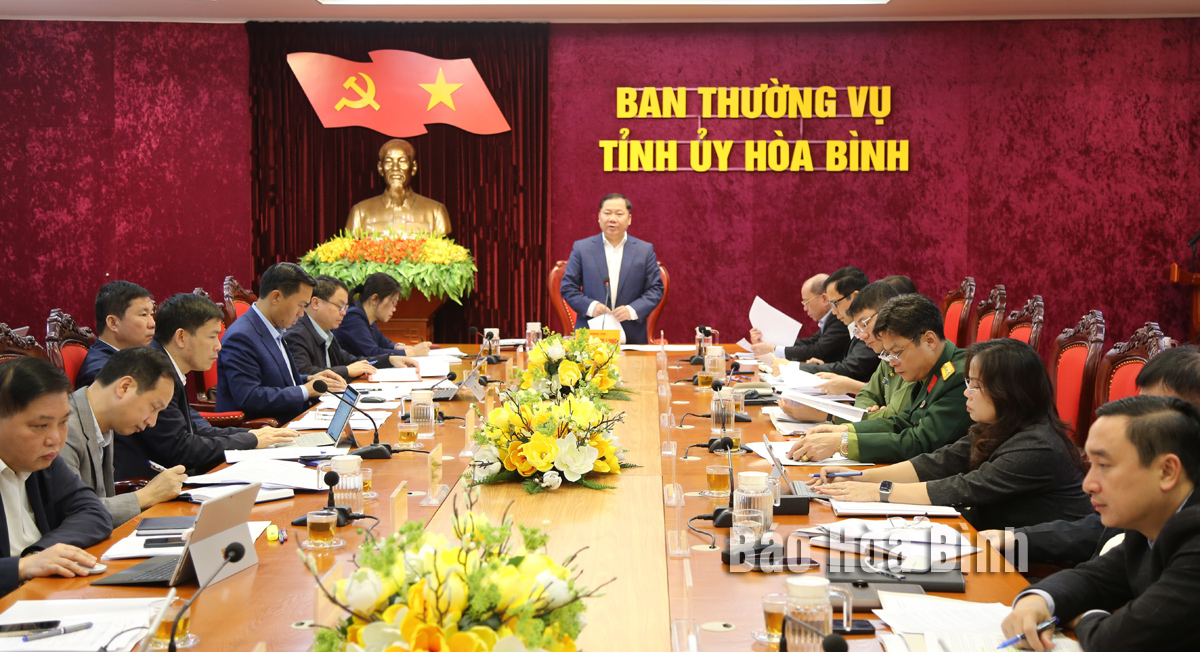The Steering Committee for the Development of Science, Technology, Innovation, and Digital Transformation of Hoa Binh province convened a meeting on March 11 to deploy key tasks.
Nguyen Phi Long, alternate member of the Party
Central Committee and Secretary of the provincial Party Committee, speaks at
the event.
The event was chaired by Nguyen Phi Long, alternate member of the Party Central
Committee and Secretary of the provincial Party Committee, and head of the
Steering Committee. It also saw the attendance of Bui Thi Minh, Permanent
Deputy Secretary of the provincial Party Committee, Chairwoman of the
provincial People's Council, and head of the provincial Party Committee's
Organisation Board; and and Bui Duc Hinh, Deputy Secretary of the provincial
Party Committee and Chairman of the provincial People's Committee, along with
other members of the Steering Committee.
During the meeting, Minh announced the decision to establish the Steering
Committee which consists of 22 members, with Long serving as Chairman.
The committee is tasked with researching, advising, and assisting the
provincial Party Committee and its Standing Board in directing the
implementation of key tasks outlined in the Politburo’s Resolution No.
57-NQ/TW, dated December 22, 2024, on breakthroughs in science and technology
development, innovation, and national digital transformation. The committee
will also supervise the performance of provincial agencies, localities,
and units.
Presenting a report on the current development of science, technology,
innovation, and digital transformation in the locality, Bui Duc Nam, Director
of the Department of Science and Technology said in recent years, investment
and resource mobilisation for science and technology development has received
increasing attention.
Twenty-one enterprises in the province have established Science and Technology
Funds, covering diverse fields. The province has 15 organisations, 10
enterprises, and 108 individuals actively engaged in this sector. However,
challenges remain, including the shortage of highly skilled human resources in
digital transformation.
Limited market demand for scientific and technological products within the
locality is also an issue, along with the low level of IT application, and
limited digital skills among residents, especially those in mountainous and
ethnic minority-inhabited areas.
Under Action Programme No. 33-CTr/TU, issued on February 20, 2025, the
provincial Party Committee has identified science, technology, and innovation
as one of the five strategic breakthroughs for local socio-economic
development. It aims to create a breakthrough in modern labour forces and a
knowledge-based economy to improve its productivity, quality, efficiency, and
competitiveness.
The province will allocate at least 3% of its annual budget for science,
technology, innovation, and digital transformation, with the possibility of
increasing this amount based on development needs. It will also establish at
least one modern, centralised research and technology application zone by 2030.
The rate of residents and businesses using online public services is expected
to exceed 80% and the adoption of online payments in settling administrative procedures
and public services to reach 80%. By 2030, over 95% of local residents will
have electronic health records
The meeting also approved the Steering Committee’s operational regulations,
assigned responsibilities to its members, and discussed working programme for
this year.
Addressing the event, Long emphasised that Resolution No. 57 represents a
revolutionary shift and an inevitable trend, serving as a key driver of
development and integration. He highlighted the Party and State's policies
supporting the development of science and technology.
He also stressed the importance of aligning science and technology development
with streamlining government structures, building digital governance and
society, enhancing human resources, and simplifying administrative procedures
to better serve businesses and the public.
The provincial leader also outlined several key tasks, including upgrading
telecommunications infrastructure, ensuring that 80% of online public services
reach Level 3 or Level 4, and enabling all administrative procedures to be
conducted through online platforms. The number of administrative procedures
will be reduced by 30%, he added.
He underscored the need to complete electronic health records and implement
land data management systems as well as publicly disclose urban and land-use
plans for easy access by businesses and residents.
It is necessary to support startup projects and promote digital payments and
increase investment in health care and education, Long added.



